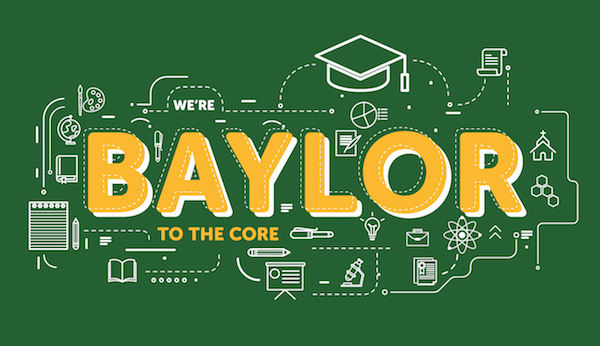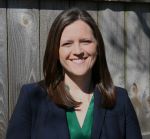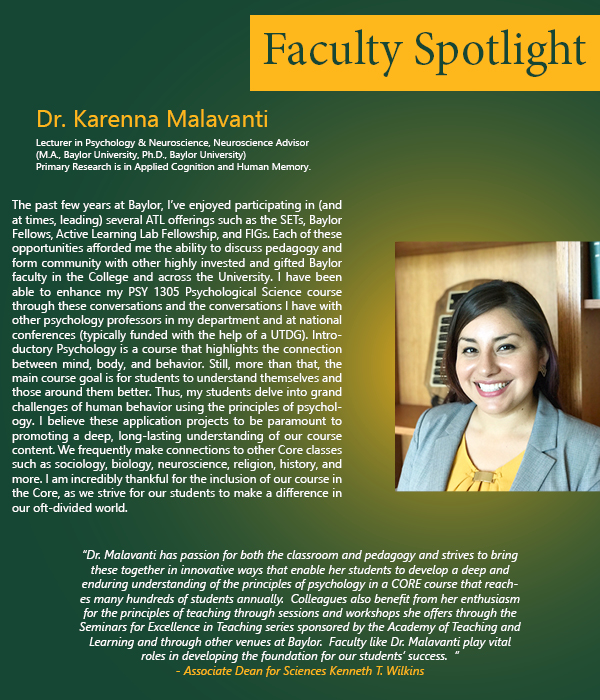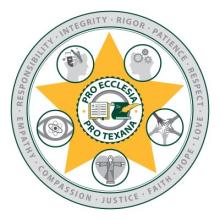2020-2021, Issue 2 Spring
Core Faculty Newsletter
2020-2021, Issue 2 - Spring
Dear Colleagues,
The Spring 2021 semester is well underway and the Office of the Core in the College of Arts & Sciences would like to highlight resources, opportunities, and news from across Baylor’s campus that speak to the vision of the A&S core curriculum as well as promote faculty development and general education more broadly. You are receiving this latest edition of the Core Faculty Newsletter because you are one of the 349 Baylor faculty teaching an impressive 668 sections for a total seat enrollment of 21,741 in the unified core curriculum this Spring 2021 semester.
Before I provide those highlights, however, I want to announce that after three years serving as Director of the Office of the Core, I have decided to return to full-time teaching for the Department of History beginning in August 2021. I am pleased to let you know that Dr. Danielle Williams, Senior Lecturer in ENG and Director of First-Year Writing, has accepted Dean Nordt’s offer to become the second Director of the Core. Please join me in congratulating Dr. Williams and welcoming her into this important position! I am certain the Office of the Core will thrive under her experienced leadership.
As I reflect on my time as Director, I want to thank each of you for your continued commitment to offering the best general education in America, even as we continue to navigate the challenges posed by teaching in times of a pandemic. It has been an honor and a privilege to work alongside all of you in this endeavor.
And so, in this final edition of the Core Faculty Newsletter for which I am Director, Dr. Christopher Richmann (ATL Assistant Director), in his latest contribution to 'The Teaching Corner,' invites us to consider ways we can intentionally cultivate student attention for learning in online courses; Dr. Darin Davis (IFL Director) presents on the topic of happiness amidst the considerable challenges that students and educators now face; and as we all work toward inclusive classroom environments for our students, a list of beneficial workshops and multicultural events for faculty are highlighted in our sections on 'Diversity and the Core' and 'Opportunities for Engagement.'
But first, join me in recognizing our colleague Dr. Karenna Malavanti, who has the honor of serving as our Spring 2021 "Faculty Spotlight." Associate Dean Kenneth T. Wilkins notes her passion for both the classroom and pedagogy as well as her efforts to bring these together in innovative ways that enable her students to develop a deep and enduring understanding of the principles of psychology in a Core course. Each Core Faculty Newsletter begins with a Faculty Spotlight in which we celebrate the talent of those among us and their commitment to teaching in the core curriculum.
For more information on the Arts & Sciences core curriculum, including a complete list of courses, definitions for all core virtues, as well as a Baylor password protected faculty teaching resources page, visit www.baylor.edu/ascore.
Sincerely,
Lauren Poor, Ph.D.
Director of the Core, College of Arts & Sciences
The Teaching Corner: Pedagogy and the Core
Are They Paying Attention?
- Dr. Christopher Richmann, ATL Assistant Director
Twenty minutes into class, you look out across the room and “read” the students. Some are looking at you intently. Others have their eyes closed, chin resting in hand. Several are talking back and forth. A couple are typing feverishly on laptops. Even more are hidden behind their computers.
Are they paying attention? It’s not a simple question since you always have incomplete evidence. After all, without seeing a student’s computer screen, typing can mean faithful notetaking or shopping for boots. Those of us teaching online or hybrid courses face an added challenge—you need to scroll across the Zoom display to “read the room,” and the visual information is flattened into a two-dimensional square displaying the student from shoulders up, often poorly lit. And, oh yeah, a third of the Zooming students don’t have their cameras on.
Regardless of our teaching “modality,” we are all concerned with student attention. Partly this is ego. Student attention means they are reciprocating the attention we devoted to the class session, in learning our disciplines, preparing learning activities, and actively working to engage students. But attention is not just a matter of validating the instructor. Attention is directly related to learning, as James Lang reminds us in his new book, Distracted: Why Students Can't Focus and What You Can Do About It. We, therefore, have every reason to care deeply that our students are paying attention.
These insights, says Lang, suggest “a fundamental shift in our thinking: away from preventing distraction and toward cultivating attention.”
We will never fully know if our students are paying attention. But we know that attention matters, and thanks to a growing body of research and insightful summaries like Lang’s Distracted, we can more intentionally cultivate their attention for learning.
Diversity and the Core
Diversity & Inclusion in the Classroom
- Dr. Kimberly Kellison, Associate Dean for Humanities and Social Sciences
- Dr. Elizabeth D. Palacios, Dean for Student Development
Faculty members teaching in the Core Curriculum continue to incorporate diversity and inclusion into their teaching. In Fall 2020, Core Curriculum colleagues had the opportunity to participate in two university-wide dialogues, “Our Voices: Serving our Hispanic/Latinx Students,” held in October, and “Our Voices: Serving Our Asian/Pacific Island Students,” held in November. Core Curriculum faculty members Yoshiko Fujii Gaines, Jerry Park, and Jonathan Tran were panelists in the November seminar.
On the college level, in Summer 2020, Dean Nordt appointed a College of Arts & Sciences Diversity and Inclusion Committee, which will meet throughout the 2020-2021 academic year. One of the A&S committee's goals is to make curricular recommendations that, along with the diversity component of the Core Curriculum, will strengthen and enhance the College’s commitment to diversity and inclusiveness in the classroom. Once approved by Dean Nordt and the A&S Council of Chairs, the committee’s full set of recommendations and action steps will comprise Pillar Five of the College’s Five Year Plan, A&Spire to Illuminate.
As we work toward inclusive classroom environments for our students, there are numerous occasions for you, your colleagues, and your students to participate in diversity opportunities at Baylor and in the wider academic community, including:
- February 18, 3:30 – Lord Don’t Move the Mountain: Women’s Voice in Gospel Songs & Hymns, Opening Keynote – Dr. Mellonee V. Burnim “The Song-Sermon as Signature Shirley Caesar More Information
- February 23, 3:30 - Force and Freedom: Black Abolitionists and the Politics of Violence - Baylor History Department and the Society for Historians of the Early American Republic (SHEAR) invite Dr. Kellie Carter Jackson of Wellesley College to discuss her new book.
- February 25, 3:30 – Lord Don’t Move the Mountain: Women’s Voice in Gospel Songs & Hymns, Panel Discussion “On Themes of Influence, Innovation, and Invocation” More Information
- March 20 - Baylor Leadership Summit (Virtual), Keynote speaker and presenter Brenda Salter McNeil More Information
- April 14 - Of Daughters and Mothers with Cherry-Award winner Dr. Jennifer Cognard-Black, Professor of English at St. Mary's Colege of Maryland. Dr. Cognard-Black will read from recent and past creative work that considers the fraught yet resonant relationship between daughters and mothers through a sampling of both realistic and fantastical fiction.
If you have any speakers or events that you would like to publicize that relate to multicultural experiences, please send us your information to share with our campus community. For faculty resources, you may also visit the Core Diversity & Inclusion webpage.
Virtues and the Core
What is Happiness?
- Dr. Darin Davis, IFL Director
As we teach courses in the Core Curriculum that help to foster virtues like justice, honesty, courage, and wisdom—indeed, as we teach any course whatsoever —we begin to realize that the “big questions” are always present and urgent.
Last semester was perhaps the most meaningful and rewarding semester in my twenty-plus years of college and university teaching. In the midst of a pandemic, a contentious election, and widespread unrest in our country about matters of race and justice, I was honored to teach and learn alongside some of the brightest and most determined students I have ever known.
Our topic was happiness.
We asked important questions. First and foremost, what is happiness? Is it an emotional state that ebbs and flows or something more akin to human life's ultimate goal? We asked whether happiness requires meaningful work, material wealth, security, and physical health. We asked whether happiness necessarily involves the happiness of others and whether it can ever be sought apart from the pursuit of a common good. We also asked whether happiness is something that we cannot achieve by dint of our own effort. How might happiness be understood as a gift from God, realized completely in the life to come? Together we carefully read a variety of sources—some contemporary, some ancient. We discussed what we read and listened to one another carefully (especially because listening takes extra effort when speaking through a mask and at a distance).
But more importantly, we looked at the world around us—with all that 2020 showed us—and realized just how inescapable our questions about happiness were. Happiness, and its fragility, was no abstract notion for us.
So much attention has been given to the considerable challenges that students and educators now face. These are difficult times. But we do well to realize the opportunities we have, too. Maybe one day I will write about what these days full of illness, suffering, injustice, courage, perseverance, and hope have taught me about happiness. Right now, like many of you, it is too early for that. I am simply more grateful than ever to teach and learn alongside our students, and I am likewise grateful for colleagues like you, who share in this sacred work.
Suggested Reading: Darin H. Davis, “Seeking the Common Good by Educating for Wisdom," Christian Scholar’s Review, 49:4, 343-353.
Please visit the IFL website for future opportunities for engagement.
Creative Arts Experience
Celebrating Art in a Pandemic
- Jennings Sheffield, CAE Committee Chair
- Kaity Briscoe, CAE Director
The Creative Arts Experience’s (CAE) mission is to engage students in the fine arts community at Baylor by providing programs of art, music, theatre, film, and literature, with the additional focus of these arts as seen through the lens of world cultures. Through participation in CAE events, students grow and mature in the reception, interpretation, and appreciation of the arts and develop cultural literacy, critical thinking, social skills, and patronage of the arts.
As you can imagine, this year, the pandemic presented quite a challenge for the arts. However, as faculty began to adapt and change, and their delivery methods of curriculum needed to change, the CAE, in collaboration with faculty, were able to create new ways to deliver and record attendance for these virtual events. The new online events were offered through a combination of QR codes, YouTube channels, and reflection questions. We are pleased to say, as a result of everyone’s efforts, the CAE hosted 150 synchronous, asynchronous, and in-person events that served over 4,763 Baylor students. CAE will continue to offer in-person, synchronous, and asynchronous events in all categories to provide the maximum opportunities to our students.
Coming up this Spring, we are excited to announce that Literature and World Cultures will be hosting an event titled Of Daughters and Mothers presented by Cherry-Award winner Dr. Jennifer Cognard-Black. Dr. Cognard-Black will read from recent and past creative work that considers the fraught yet resonant relationship between daughters and mothers by sampling both realistic and fantastic fiction. She will present this work through a staged reading. Join us on April 14th, 2021, for this event.
Faculty members who would like to propose additional CAE events may do so here. For more information, please visit the CAE webpage or email Kaity Briscoe or Jennings Sheffield.
Chapel and the Core
Virtual Service, Visible Impact
- Dr. Burt Burleson, University Chaplain
Chapel has always been changing. As the culture changed, as students changed, as the world changed, Chapel has changed. From a morning prayer service led by the president of the university to an experience focused on bonding students to Baylor and its community to a forum for ideas and current topics addressed by speakers of all kinds to a worship service, to a blend of worship and forum... chapel changes and is changing now.
As our student body grows more diverse with regards to interests, needs, passions, denominational traditions, and spiritual depth, we are moving away from a “one size fits all” approach to chapel. These days, in addition to our “big chapel” (see below), students can participate in a morning or evening prayer service. They can take part in Chapel Studies such as “Praying the Psalms” or “Faith and the Healing Professions” or “Faith in a Veteran’s Life.” The approach is to create more choice and more focus to meet students where they are.
This Spring, Chapel Online will take our students through the Christian Scriptures beginning with a focus on the parables of Jesus, then to the journey Jesus makes to and through Holy Week, and on to the beginnings of the Church and into the New Creation. We hope that, as restrictions are relaxed, various churches and ministries can actually gather students to watch chapel together and have a time of discussion afterward.
As those who teach in the Core help create a common experience, please take some time and watch a few of the Fall chapel sessions and those that are posted this Spring. You are likely teaching our new students, and awareness of what’s happening in Chapel would likely give you helpful perspective and opportunities to think with them as faith animates their academic experience.
Common Readers
Common Course, Common Reader
- David Aycock, Baylor University Press
- Jenny Hunt, Baylor University Press
Baylor University Press and Baylor faculty have partnered to produce two new and exciting volumes that Baylor’s undergraduates will widely use. The Departments of History and English, the Office of the Core, the Academy of Teaching and Learning, and the Dean’s Office in the College of Arts & Sciences supported both volumes by providing logistical aid and funding toward graduate student assistance and production expenses.
The United States in Global Perspective
The United States in Global Perspective represents more than a year of research and editorial development to provide a vibrant collection of primary sources that gives instructors a tool that “globalizes” instruction. Through a variety of textual and visual sources, students can investigate the long history of the region’s engagement with the world and how the world has shaped the United States. Continue Reading
American Literary Cultures
American Literary Cultures highlights literature written by regional authors—particularly those of Texas and the Southwest—and includes readings representing a broad array of American social, religious, racial, and ethnic groups from the first contact to early twentieth-century Modernism. The volume will be used in sections of ENG 2310 American Literary Cultures: Imagining the American Experience, which focuses on the diverse literary cultures of the United States, from the early nineteenth century to the present.
If you are interested in developing a textbook or reader, please contact Baylor University Press Interim Director David Aycock.
Opportunities for Engagement
- February 18, 3:30 – Lord Don’t Move the Mountain: Women’s Voice in Gospel Songs & Hymns, Opening Keynote – Dr. Mellonee V. Burnim “The Song-Sermon as Signature Shirley Caesar More Information
- February 23, 3:30 - Force and Freedom: Black Abolitionists and the Politics of Violence - Baylor History Department and the Society for Historians of the Early American Republic (SHEAR) invite Dr. Kellie Carter Jackson of Wellesley College to discuss her new book. More Information
- February 25, 3:30 – Lord Don’t Move the Mountain: Women’s Voice in Gospel Songs & Hymns, Panel Discussion “On Themes of Influence, Innovation, and Invocation” More Information
- March 2, 3:30 – Lord Don’t Move the Mountain: Women’s Voice in Gospel Songs & Hymns, Closing Keynote – Dr. Alisha Lola Jones “Something Within” More Information
- March 20 - Baylor Leadership Summit (Virtual), Keynote speaker and presenter Brenda Salter McNeil More Information
- April 14 - Of Daughters and Mothers with Dr. Jennifer Cognard-Black, Professor of English at St. Mary's Colege of Maryland. Dr. Cognard-Black will read from recent and past creative work that considers the fraught yet resonant relationship between daughters and mothers through a sampling of both realistic and fantastical fiction.
- If you would like to receive the MA Times, please sign up here.
To view more opportunities for engagement and further details, please visit the Opportunities for Engagement webpage.










